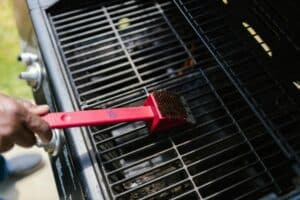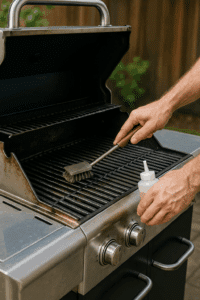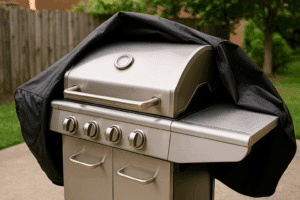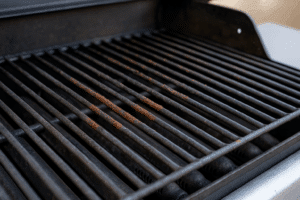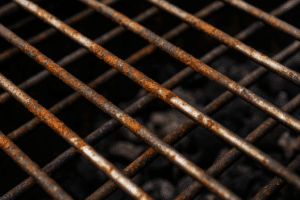If you’ve ever looked at your grimy grill and thought, “Can I just hose this thing off?”—you’re not alone. It’s a common question. And while the answer isn’t a flat no, it does come with some serious warnings.
In this guide, we’ll walk you through:
- When it’s safe to use water on your grill
- Which parts you should never hose
- How to clean your grill thoroughly without damaging it
- And when it’s smarter to call in a professional
By the end, you’ll know exactly what your grill can handle—and how to clean it without ruining it.
TL;DR: Can You Hose Down a Grill?
Yes, but only certain parts—and only under the right conditions.
Hosing down your grill can help remove heavy debris and soften caked-on grease, but water and electronics don’t mix. Neither do water and firebox rust. If you’re not careful, you can:
- Kill your igniter
- Create internal rust damage
- Soak gas lines or regulators
- Void your warranty
- Or leave moisture that attracts mold and bacteria
So, yes, you can use a hose—but you need to know exactly where and how.
When Hosing Is Safe (And When It’s Not)
You can hose:
- Grates (after removal)
- Flavorizer bars
- Heat shields
- Empty grease trays
- Exterior surfaces (stainless steel, powder-coated, cast aluminum)
You shouldn’t hose:
- Inside the firebox (where burners live)
- Ignition system (battery box, electrode, wires)
- Control knobs or gas manifolds
- Burners with ports still clogged
- Under or near the regulator and hose connection
Important:
Always disconnect propane or shut off natural gas first.
Never hose down a hot grill.
Always dry completely after using water to avoid rust.
The Better Way to Use Water on a Grill
If you’re trying to clean without professional tools, here’s a safer method:
Step-by-step:
- Remove grates, flavorizer bars, and other loose parts
Take them out of the grill body and place them on a concrete or gravel surface. This keeps water away from sensitive internal components. - Spray them down with a hose or pressure nozzle
Use a standard garden hose or a moderate-pressure spray to knock off built-up residue. Avoid high-pressure washers—they can damage enamel or ceramic coatings. - Degrease with a grill-safe cleaner or vinegar solution
Apply a non-toxic degreaser or a 50/50 vinegar-water mix. Let it sit 5–10 minutes, then scrub with a grill brush or scouring pad. - Rinse again and dry thoroughly
Wipe everything down with a dry towel and let it air dry fully before reassembling. If parts stay damp, they’ll rust fast. - Never spray water directly inside the grill body
Instead, use damp cloths or steam to loosen buildup. If it’s heavily soiled, you may want Fire & Metal’s steam cleaning service, which safely breaks down grease inside the firebox without water damage.
What Happens If You Hose the Wrong Parts?
We’ve seen the aftermath too many times. Customers call us after trying to clean with a hose and finding:
- Igniters that won’t click anymore
- Burners that sputter, pop, or won’t stay lit
- Grills that smell musty or produce smoke without flames
- Corroded regulators or soaked electronics
Often, a simple clean turns into a $300+ repair—just because water got where it shouldn’t.
What About Pressure Washing a Grill?
Short answer: Don’t.
While you might see viral videos of people blasting their grills clean, pressure washers can:
- Strip paint or protective coatings
- Drive grease deeper into hard-to-clean areas
- Force water into gas valves or igniters
- Damage ceramic or porcelain parts
If your grill is filthy enough to consider pressure washing, it’s time for a professional cleaning instead. Find out if professional grill cleaning is worth it.
The Fire & Metal Alternative: Steam, Not Spray
At Fire & Metal, we use high-temperature steam and biodegradable degreasers to clean your grill inside and out—without soaking sensitive components or risking rust.
Our service includes:
- Full firebox and burner steam cleaning
- Degreasing and polishing all components
- Safe, water-controlled cleaning methods
- Ignition and regulator inspection
- Free quote + system assessment
Steam kills bacteria, removes carbon buildup, and reaches areas you simply can’t get to with a hose—and it’s safe for all parts.
Want us to do it for you? Book your free on-site assessment here
Final Thoughts: Yes, You Can Hose—But Should You?
Water can be helpful—but only when used strategically. If your grill is lightly dirty and you remove the parts first, go for it. But if you’re dealing with:
- Heavy grease
- Sticky soot
- Foul smells
- Or uneven flames…
Spraying your grill might make things worse, not better.
Your grill is an investment—and keeping it clean shouldn’t destroy it. When in doubt, don’t reach for the hose—reach for an expert.


